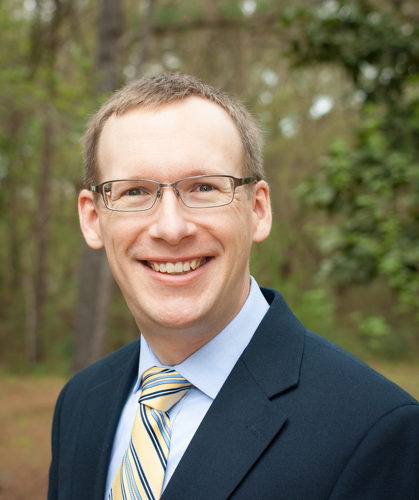Each week, SFRC highlights a fantastic student or alumnus for #FeaturedStudentFriday. Today’s alum is Dr. David Godwin. David earned his M.S. and Ph.D. in Forest Resources and Conservation with SFRC. He now works as the Director of the Southern Fire Exchange.

What’s the best thing about your current position?
I love that I have the honor of working on something that I truly believe in that’s in a field where the demand is pressing. As the Director of the Southern Fire Exchange, I work with a fantastic collaborative team and dedicated partners across the Southeast to solve problems in wildland fire using the best available science and tools. At the end of the day, I know that what we’re doing is addressing problems, finding solutions and sharing information that can make a difference in how our society manages natural resources. How cool is that?
Was there any key thing that set you on the path towards SFRC?
A year or so after I finished my undergraduate degree (B.S. in Geography at Florida State University), I started a job with the Florida Fish and Wildlife Conservation Commission. The opportunity to work on wildlife management areas across the state exposed me to the critical importance of fire in management Florida’s ecosystems. After working in that position for a couple of years, I determined that to be competitive in the field it was time to return to school to learn more about managing fire and natural resources in the Southeast. I cold-emailed a professor at SFRC asking about opportunities in the fire science lab and within a short time I was offered a graduate research assistantship working on a wildfire study in the Ocala National Forest. After that project wrapped up and I finished my M.S. in Forest Resources and Conservation, I had the opportunity to continue with SFRC to work towards a Ph.D. focused on fire science research. I finished that program four years later.
What drives you? Why is this important or significant to you personally?
Fire is a nearly ubiquitous opportunity and challenge. It’s an ecological imperative for so many terrestrial ecosystems and yet managing and applying fire in contemporary times can be fraught with obstacles. Many of our most cherished and threatened plants and animals thrive with the proper application of fire. In fact, fire maintains and cultivates some of the most beautiful landscapes in our country and without fire those systems can change in potentially irreversible ways. Walking in a fire-maintained old-growth longleaf pine forest, while listening to birds foraging in the canopy is enough to convince most people about the value of maintaining fire regimes. What drives me is finding and sharing science-based solutions for safely living with and using fire in the 21st century with 327 million people in the United States. It’s a lofty challenge with some amazing and talented people working on it, but the consequences of failure include dangerous wildfires, species extinctions and ecosystem conversions.
What were your struggles to get where you are today?
Graduate school was not easy for me. Learning and managing multi-year research projects was rewarding and interesting, but it certainly involved sacrifices that impacted my schedule and my family. Now that I’m out of graduate school, I’m thankful to have a better work-life balance that allows me to be involved in my kid’s activities and spend time with my family on the weekends.
What advice would you give to a younger you?
Get involved. If you’re an undergraduate student, get involved in a research project on campus. You’ll meet the faculty and other students, you’ll learn about research, you’ll probably get into the field to collected data and you might get a publication. It might even lead to a fun summer or part-time job. If you’re an undergraduate student and you’re interested in fire or natural resource management, look for seasonal positions with one of the big federal agencies. Once you’re out of school or have a family, it’s significantly more difficult to pick up and move across the country for a seasonal job.
Finally, if you’re an undergrad or a graduate student, get involved with a club or organization related to the profession of your field of study. Join the Society of American Foresters, the Wildlife Society, the Student Association for Fire Ecology or something similar. Once you get the know the organization, take on a leadership position, go to conferences and get to know as many people in the field as you can.
Do you have any favorite memory of your time at SFRC?
One of my favorite memories with SFRC involved a study we had on the Ocala National Forest (ONF) in the Juniper Prairie Wilderness. During the project we were invited by the ONF to fly in a helicopter to survey the study area and investigate the impacts of recent nearby wildfire. It was my first flight in a helicopter and it was an amazing experience!
Are you working on anything exciting you’d like to share?
With our Southern Fire Exchange leadership team, we’re currently working on an exciting suite of projects that coincide with the 10-year anniversary of the program. We’re working with UF IFAS Communications on a video that will showcase how investments in fire science are successfully changing how land managers deal with putting fire back into long-fire excluded sites. We’re also looking forward to rolling out a series of regional fire science success stories as well as a brand-new website that will provide enhanced access to our resources and programs.
 0
0
